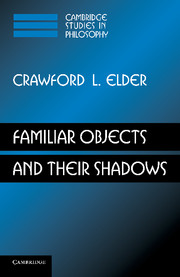Book contents
- Frontmatter
- Contents
- Acknowledgments
- Introduction
- 1 Two false friends of an ontology of familiar objects
- 2 Conventionalism as ontological relativism
- 3 Realism about material objects: persistence, persistence conditions, and natural kinds
- 4 Ontological preference for the temporally small
- 5 Ontological preference for microphysical causes
- 6 Ontological preference for the spatially small
- 7 A third false friend of familiar objects: universal mereological composition
- 8 Concluding Hegelian postscript
- Appendix: “Mutually interfering” dimensions of difference
- References
- Index
2 - Conventionalism as ontological relativism
Published online by Cambridge University Press: 25 January 2011
- Frontmatter
- Contents
- Acknowledgments
- Introduction
- 1 Two false friends of an ontology of familiar objects
- 2 Conventionalism as ontological relativism
- 3 Realism about material objects: persistence, persistence conditions, and natural kinds
- 4 Ontological preference for the temporally small
- 5 Ontological preference for microphysical causes
- 6 Ontological preference for the spatially small
- 7 A third false friend of familiar objects: universal mereological composition
- 8 Concluding Hegelian postscript
- Appendix: “Mutually interfering” dimensions of difference
- References
- Index
Summary
In the previous chapter I defended a realist position on kind-sameness and on numerical persistence. I held that nature's kinds typically fall into families; that properties of certain sorts are common to the members of each such kind and differentiate the kinds within each family; and I briefly sketched the ways we learn, empirically, which sorts of properties are, in this way, constitutive of kind-membership. I held also that retention of properties of these same sorts sets up persistence conditions for the members (and samples) of nature's kinds – meaning that persistence conditions, too, are things we learn from nature. Both these claims are contested by the view I called “conventionalism.” Conventionalists, as I said, hold that descriptive content written into the very meanings of our sortals and matter-names fixes which sorts of properties are determinative of kind-membership and of persistence.
But this basic conventionalist message can be articulated in either of two quite different ways, and thus far I have examined only one. The articulation I have so far examined says: since it is the very meanings of our sortals and matter-names that fix which sorts of properties determine kind-membership and mark out persistences, the truths as to which properties these are, in the case of each natural kind, are analytic, and they do not have truth conditions. They are true, but they are not true in virtue of anything.
- Type
- Chapter
- Information
- Familiar Objects and their Shadows , pp. 30 - 53Publisher: Cambridge University PressPrint publication year: 2011

